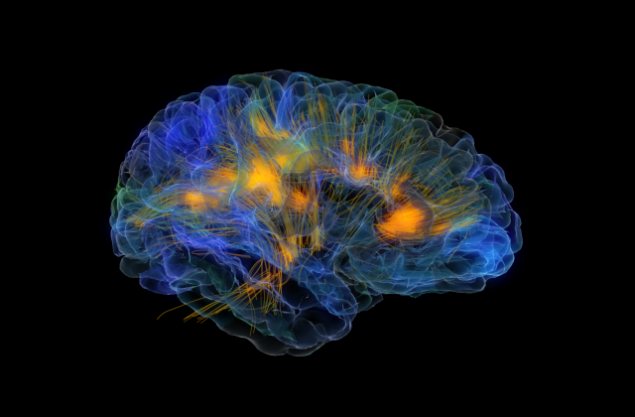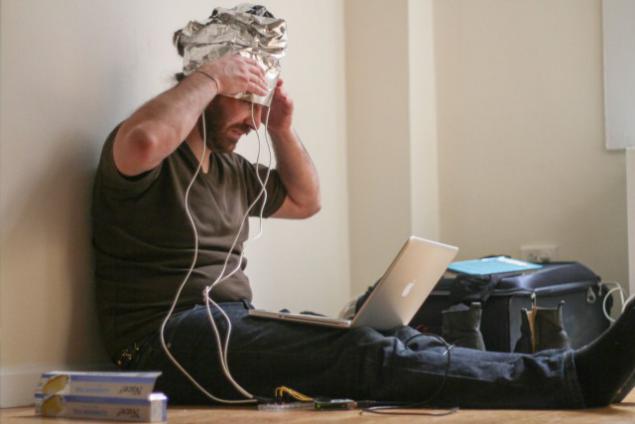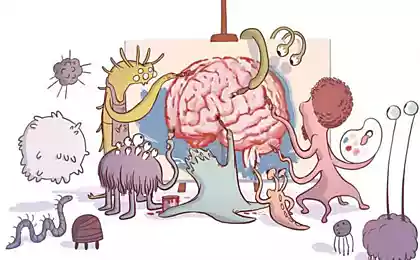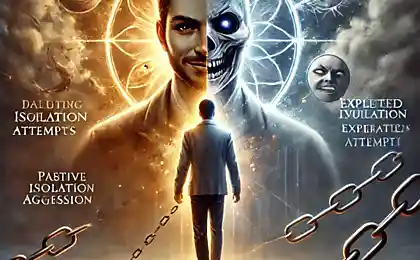810
10 exciting ways to manipulate your brain
In the "effect" Scientists examined the brain is constantly looking for new ways to treat diseases and disorders. "Side effects" that are unexpected discovery of ways in which you can "confuse" any human brain.
1. Hot-holodnoMy do not think about how our thoughts and behavior can be modified by heat or cold. Scientists have made an interesting and potentially important findings of the research concerning temperature conditions. They invited a man in a hot room and asked to describe the behavior of the offender. According to the test, the offender acted violent and spontaneous.

Man in cold room is likely to define the same as a cold-blooded criminal, and his behavior deems intentional. It turns out that the room temperature can have a huge impact on the outcome of the trial and sentencing.
An earlier study showed that the change in temperature also affects the trust. In the experiment, some participants heated hand warmer chemical, and others held an ice pack. Subjects were given the opportunity to testify against their partner in exchange for a reduced sentence of their own.
The results showed that subjects who held an ice pack, twice as likely to testify against his partner. On this basis, we can assume that people no longer trust each other when they are warm.
2. Decoder mozgaEksperty suggest that you read in silence, listening to someone or think "to myself," you have activated the same areas of the brain. Brian Pasley, a scientist from the University of California at Berkeley, said: "When you read the text in the newspaper or a book, you hear a voice in my head».

"We're trying to decipher brain activity associated with that voice, to create a medical prosthesis that will communicate paralyzed or deaf people", - he explains the purpose of the experiments. Pasley and his team are studying epileptics with implanted electrodes in their brains noticed the activity of neurons in the temporal lobe of patients when they hear someone talking.
Having learned that some clusters of neurons react to specific frequencies, the researchers tried to create on the basis of active neurons algorithm to determine the words that they hear. If someone has worked well the same neurons, the algorithm was theoretically decode words they think.
To ensure the accuracy of the algorithm, the researchers tested the study of another group of epileptic patients with implanted electrodes. Each subject was asked to read the text aloud, so that researchers can create a personal decoder, based on the activity of the brain of the subject.
Each subject was reading the same text in silence, to check the accuracy of the decoder. While the brain activity of reading about a little different from reading aloud, the researchers were still able to decipher some words correctly. However, their algorithm is still a lot of work before it will be accurate enough to help people with disabilities.
3. The illusion of marble rukiIssledovateli spent a lot of experiments to determine how the human brain and feel your body's position in space. As a rule, they are influenced by visual signals our perception. In an unusual experiment, the researchers tested the effects on our body sound and touch and how it perceives the material.
In particular, the researchers wanted to see whether the subjects believe that parts of their bodies are composed of non-living matter. Scientists conducted an experiment in which the participant was asked to put his hands on the table in front of him. Then, on his right hand hammer knock. Every time the hammer starts pounding, party heard the sound of hitting the marble.
A few minutes later the man felt his hand becomes unnaturally solid and heavy, like a piece of marble. However, his pain threshold fell sharply. Researchers tested this by threatening party needle, which put it to his hand very close, but there was no reaction.
In contrast to the position in space and materials of the body do not change. Thus, scientists have discovered that the human brain constantly takes information from its senses, to update the perception of the material of the body. This explains why the body of a disabled person can easily take artificial limb.
4. The tablet miloserdiyaMy tend to think that the tablet - is a tool for controlling the disease. However, researchers from the University of California found that they can affect the level of human compassion, changing the chemical composition of the brain. Scientists conducted an experiment in which participants were given placebo pills and tolcapone.

Tolcapone used to treat Parkinson's disease, promotes the production of the chemical dopamine, which is in the prefrontal cortex and associated with the motivation and incentives. Neither the researchers nor the subjects knew who received the drug and who the placebo.
After taking the pill, participants had to share money with strangers. Compared to people who took a placebo, swallow tolcapone tried to divide the money equally with strangers.
"We often think about justice as a stable characteristic of his personality, - says researcher Xu Ming. - Our research does not reject the idea, but it does not mean that this feature can systematically influence the specific neurochemical ways in the human brain ».
5. Extreme izolyatsiyaIzolyatsiya, especially in people who are chronically lonely, produces profound physical effect. This can lead to accelerated rates of infection, high blood pressure, Alzheimer's disease, dementia, and so on. D. Insulation provoke serious immune response that fills our hormonal system stress and inflammation.

The most alarming consequences - psychic. Extreme isolation, such as solitary confinement, could harm mental health. This is due to the slowing down of time and the possible appearance of hallucinations. Effects of long isolation can be devastating.
In 1961, during an expedition in the French Alps geologist he remained underground without daylight for two months - long enough to see the changes in your body. When he came to the surface, his team found that he had experienced a time shift. For him 5 minutes have passed for 120 seconds.
In another experiment, 1993, Maurizio Montalbini went down to the cave at 366 days. When staying underground was over, he thought he was held there for only 219 days. The researchers also found that people isolated in the dark, as a rule, change the cycles of sleep and wakefulness; they awake for 36 hours and then for 12 hours of sleep.

Social isolation can cause hallucinations. Many experiments on this subject could not be completed because the subjects appeared strange symptoms. In Iran, the inmate in solitary confinement for 32-year-old Sarah Shourd had seen and heard a lot of things imaginary.

Here is what she wrote about their experience: "peripheral vision, I began to see the flashing lights, but when I turn my head, they immediately disappeared. & lt; ... & gt; At some point I heard someone shouting very much. Later, I felt the hand of one of the guards who slapped me in the face, and then I realized that the screams were my own ».
6. Effect Mac GerkaMy use vision to understand what we hear. But sometimes it can lead us astray. For example, if you hear someone say "ba", but you have seen that pronounced "ha", your mind will lean closer to what you see - and get "yes».
The brain tries to understand the conflict between what we see and hear. Thus, we can not always believe what we hear, though with certain sounds, especially pairs of consonants, the effect is amplified. If you close your eyes, it would be the best to hear "ba", because that is no distortion of perception of visual support.
Even if you know that you are under the influence of the effect it all exactly will be on you to act. McGurk effect works in all languages, which have been tested, even if the video and audio slightly out of sync.
This effect applies if you touch the face of the speaker, but do not look at him. According to the researchers, this effect is even exposed infants who are four - five months.
7. Creative tolchokUniversitet Carolina experienced brain electricity volunteers to test its effect on creativity. The aim was to produce alpha rhythm in the frontal cortex of the brain, since this rhythm brain waves are associated with creativity. Alfa fluctuations come into play when we relax and close your eyes. They are associated with a dreamy, deep thinking and idea generation.

20 volunteers were 19-30 years popular Torrance test creative thinking in two stages: in one case, they received electrical stimulation of the brain, to create an alpha rhythm, and the other for stimulation forged control experiment.
The volunteers did not know where they got real and fictitious as electric shocks. In both cases, when the test began, they felt a mild tingling.
The results were impressive! According to the results of tests, participants who received the real electrical stimulation had more than 7, 4 points. "It's a pretty good result for the test to work - says the researcher Flavio Frohlich. - Some of the participants showed an incredible burst of imagination. It was very obvious effect ».
There is a simple way to boost your creativity. According to research, 2009 on our imagination can influence the color. If you want to produce more creative ideas, should be in the blue room. And if you have a more "detailed" activity, such as proofreading, select the red room.
8. TeleportatsiyaProvodya interesting experiment, the researchers created an out of body experience for their patients scientists. They thought he teleported them to different places in the room. In fact, they were in a medical scanner, but their brain is thought that they were "moved».

To determine where your body is, the brain is constantly processing information senses. Previous studies have demonstrated that rat brain cells function as a GPS and can determine whether there are other rodents nearby. But we do not believe that the human brain has the same ability.
To test how well a person feels, where his body was carried out an experiment. Participants suggested to wear a virtual reality headset and go to the brain scanner.
Using the camera in another part of the room, connected to a headset, the participant could see the stranger's body, lying in the foreground, and the body member scanned in the background. To create an out of body experience, the scientist touched the body of a member who only saw the body of a stranger had touched in the same way.
"Within a few seconds, the brain combines the sensation of touch and visual information, as a result creates the illusion of staying in someone else's body - explains the researcher Arvid Guterstam. - Your body feels perfectly normal - you are not "floating" in space ».
Through this illusion of researchers studied the brain activity of the participants after they teleport to different parts of the room. They found that the hippocampus, which has a GPS-cells, helps us determine where our body.
9. Writing mozgPishuschy brain developed in a test mode to enable people with disabilities to use my mind to write without keystrokes or blinking. Headset with electrodes used to record brain activity using eye-tracking technology, this software is on the Internet for free access.

Man enough to think of one word or some idea - and the computer immediately opens an account. The cursor on the screen will follow the movement of the human eye. The creators of "brain writing" really wanted to help the graffiti artist Tony Quan from Los Angeles, which is due to amyotrophic lateral sclerosis (ALS), lost control of his muscles.
The first version of the device, Tony had to blink, to put it in the recording mode. Unfortunately, he lost this ability when the disease has progressed. That is why the current version uses brain waves recorded by EEG (electroencephalogram), which are read by the software. This version is designed to help paralyzed people to control svom writing more effective way.
10. Illusion nevidimkiMy have said, based on the illusion that one can feel displaced in someone else's body. Scientists also found out how to make feel invisible. They conducted a test involving 20 people, of whom 75% had experienced an illusion.
Participants were given a headset connected to the camera, showing an empty space. Researcher stroked the brush member, and he saw how the brush strokes void. Brain gave participants understand that his body is invisible.
"I am very susceptible to illusions, so me it strongly acted, - says researcher Arvid Guterstam. - Do you have a feeling that you own your body, but it is - an invisible object ».
In the following part of the experiment, subjects were asked to look up. During the experiment, it was found out that some participants in the headset look down. The researchers noted that participants did not violate the conditions of the experiment, if it felt that their bodies can be seen.
Some experts believe that this effect can be used to treat phobias. In future experiments, the scientists want to see how the invisible can affect the human moral choice.
via listverse.com/2015/05/07/10-fascinating-ways-our-brains-can-be-manipulated/
1. Hot-holodnoMy do not think about how our thoughts and behavior can be modified by heat or cold. Scientists have made an interesting and potentially important findings of the research concerning temperature conditions. They invited a man in a hot room and asked to describe the behavior of the offender. According to the test, the offender acted violent and spontaneous.

Man in cold room is likely to define the same as a cold-blooded criminal, and his behavior deems intentional. It turns out that the room temperature can have a huge impact on the outcome of the trial and sentencing.
An earlier study showed that the change in temperature also affects the trust. In the experiment, some participants heated hand warmer chemical, and others held an ice pack. Subjects were given the opportunity to testify against their partner in exchange for a reduced sentence of their own.
The results showed that subjects who held an ice pack, twice as likely to testify against his partner. On this basis, we can assume that people no longer trust each other when they are warm.
2. Decoder mozgaEksperty suggest that you read in silence, listening to someone or think "to myself," you have activated the same areas of the brain. Brian Pasley, a scientist from the University of California at Berkeley, said: "When you read the text in the newspaper or a book, you hear a voice in my head».

"We're trying to decipher brain activity associated with that voice, to create a medical prosthesis that will communicate paralyzed or deaf people", - he explains the purpose of the experiments. Pasley and his team are studying epileptics with implanted electrodes in their brains noticed the activity of neurons in the temporal lobe of patients when they hear someone talking.
Having learned that some clusters of neurons react to specific frequencies, the researchers tried to create on the basis of active neurons algorithm to determine the words that they hear. If someone has worked well the same neurons, the algorithm was theoretically decode words they think.
To ensure the accuracy of the algorithm, the researchers tested the study of another group of epileptic patients with implanted electrodes. Each subject was asked to read the text aloud, so that researchers can create a personal decoder, based on the activity of the brain of the subject.
Each subject was reading the same text in silence, to check the accuracy of the decoder. While the brain activity of reading about a little different from reading aloud, the researchers were still able to decipher some words correctly. However, their algorithm is still a lot of work before it will be accurate enough to help people with disabilities.
3. The illusion of marble rukiIssledovateli spent a lot of experiments to determine how the human brain and feel your body's position in space. As a rule, they are influenced by visual signals our perception. In an unusual experiment, the researchers tested the effects on our body sound and touch and how it perceives the material.
In particular, the researchers wanted to see whether the subjects believe that parts of their bodies are composed of non-living matter. Scientists conducted an experiment in which the participant was asked to put his hands on the table in front of him. Then, on his right hand hammer knock. Every time the hammer starts pounding, party heard the sound of hitting the marble.
A few minutes later the man felt his hand becomes unnaturally solid and heavy, like a piece of marble. However, his pain threshold fell sharply. Researchers tested this by threatening party needle, which put it to his hand very close, but there was no reaction.
In contrast to the position in space and materials of the body do not change. Thus, scientists have discovered that the human brain constantly takes information from its senses, to update the perception of the material of the body. This explains why the body of a disabled person can easily take artificial limb.
4. The tablet miloserdiyaMy tend to think that the tablet - is a tool for controlling the disease. However, researchers from the University of California found that they can affect the level of human compassion, changing the chemical composition of the brain. Scientists conducted an experiment in which participants were given placebo pills and tolcapone.

Tolcapone used to treat Parkinson's disease, promotes the production of the chemical dopamine, which is in the prefrontal cortex and associated with the motivation and incentives. Neither the researchers nor the subjects knew who received the drug and who the placebo.
After taking the pill, participants had to share money with strangers. Compared to people who took a placebo, swallow tolcapone tried to divide the money equally with strangers.
"We often think about justice as a stable characteristic of his personality, - says researcher Xu Ming. - Our research does not reject the idea, but it does not mean that this feature can systematically influence the specific neurochemical ways in the human brain ».
5. Extreme izolyatsiyaIzolyatsiya, especially in people who are chronically lonely, produces profound physical effect. This can lead to accelerated rates of infection, high blood pressure, Alzheimer's disease, dementia, and so on. D. Insulation provoke serious immune response that fills our hormonal system stress and inflammation.

The most alarming consequences - psychic. Extreme isolation, such as solitary confinement, could harm mental health. This is due to the slowing down of time and the possible appearance of hallucinations. Effects of long isolation can be devastating.
In 1961, during an expedition in the French Alps geologist he remained underground without daylight for two months - long enough to see the changes in your body. When he came to the surface, his team found that he had experienced a time shift. For him 5 minutes have passed for 120 seconds.
In another experiment, 1993, Maurizio Montalbini went down to the cave at 366 days. When staying underground was over, he thought he was held there for only 219 days. The researchers also found that people isolated in the dark, as a rule, change the cycles of sleep and wakefulness; they awake for 36 hours and then for 12 hours of sleep.

Social isolation can cause hallucinations. Many experiments on this subject could not be completed because the subjects appeared strange symptoms. In Iran, the inmate in solitary confinement for 32-year-old Sarah Shourd had seen and heard a lot of things imaginary.

Here is what she wrote about their experience: "peripheral vision, I began to see the flashing lights, but when I turn my head, they immediately disappeared. & lt; ... & gt; At some point I heard someone shouting very much. Later, I felt the hand of one of the guards who slapped me in the face, and then I realized that the screams were my own ».
6. Effect Mac GerkaMy use vision to understand what we hear. But sometimes it can lead us astray. For example, if you hear someone say "ba", but you have seen that pronounced "ha", your mind will lean closer to what you see - and get "yes».
The brain tries to understand the conflict between what we see and hear. Thus, we can not always believe what we hear, though with certain sounds, especially pairs of consonants, the effect is amplified. If you close your eyes, it would be the best to hear "ba", because that is no distortion of perception of visual support.
Even if you know that you are under the influence of the effect it all exactly will be on you to act. McGurk effect works in all languages, which have been tested, even if the video and audio slightly out of sync.
This effect applies if you touch the face of the speaker, but do not look at him. According to the researchers, this effect is even exposed infants who are four - five months.
7. Creative tolchokUniversitet Carolina experienced brain electricity volunteers to test its effect on creativity. The aim was to produce alpha rhythm in the frontal cortex of the brain, since this rhythm brain waves are associated with creativity. Alfa fluctuations come into play when we relax and close your eyes. They are associated with a dreamy, deep thinking and idea generation.

20 volunteers were 19-30 years popular Torrance test creative thinking in two stages: in one case, they received electrical stimulation of the brain, to create an alpha rhythm, and the other for stimulation forged control experiment.
The volunteers did not know where they got real and fictitious as electric shocks. In both cases, when the test began, they felt a mild tingling.
The results were impressive! According to the results of tests, participants who received the real electrical stimulation had more than 7, 4 points. "It's a pretty good result for the test to work - says the researcher Flavio Frohlich. - Some of the participants showed an incredible burst of imagination. It was very obvious effect ».
There is a simple way to boost your creativity. According to research, 2009 on our imagination can influence the color. If you want to produce more creative ideas, should be in the blue room. And if you have a more "detailed" activity, such as proofreading, select the red room.
8. TeleportatsiyaProvodya interesting experiment, the researchers created an out of body experience for their patients scientists. They thought he teleported them to different places in the room. In fact, they were in a medical scanner, but their brain is thought that they were "moved».

To determine where your body is, the brain is constantly processing information senses. Previous studies have demonstrated that rat brain cells function as a GPS and can determine whether there are other rodents nearby. But we do not believe that the human brain has the same ability.
To test how well a person feels, where his body was carried out an experiment. Participants suggested to wear a virtual reality headset and go to the brain scanner.
Using the camera in another part of the room, connected to a headset, the participant could see the stranger's body, lying in the foreground, and the body member scanned in the background. To create an out of body experience, the scientist touched the body of a member who only saw the body of a stranger had touched in the same way.
"Within a few seconds, the brain combines the sensation of touch and visual information, as a result creates the illusion of staying in someone else's body - explains the researcher Arvid Guterstam. - Your body feels perfectly normal - you are not "floating" in space ».
Through this illusion of researchers studied the brain activity of the participants after they teleport to different parts of the room. They found that the hippocampus, which has a GPS-cells, helps us determine where our body.
9. Writing mozgPishuschy brain developed in a test mode to enable people with disabilities to use my mind to write without keystrokes or blinking. Headset with electrodes used to record brain activity using eye-tracking technology, this software is on the Internet for free access.

Man enough to think of one word or some idea - and the computer immediately opens an account. The cursor on the screen will follow the movement of the human eye. The creators of "brain writing" really wanted to help the graffiti artist Tony Quan from Los Angeles, which is due to amyotrophic lateral sclerosis (ALS), lost control of his muscles.
The first version of the device, Tony had to blink, to put it in the recording mode. Unfortunately, he lost this ability when the disease has progressed. That is why the current version uses brain waves recorded by EEG (electroencephalogram), which are read by the software. This version is designed to help paralyzed people to control svom writing more effective way.
10. Illusion nevidimkiMy have said, based on the illusion that one can feel displaced in someone else's body. Scientists also found out how to make feel invisible. They conducted a test involving 20 people, of whom 75% had experienced an illusion.
Participants were given a headset connected to the camera, showing an empty space. Researcher stroked the brush member, and he saw how the brush strokes void. Brain gave participants understand that his body is invisible.
"I am very susceptible to illusions, so me it strongly acted, - says researcher Arvid Guterstam. - Do you have a feeling that you own your body, but it is - an invisible object ».
In the following part of the experiment, subjects were asked to look up. During the experiment, it was found out that some participants in the headset look down. The researchers noted that participants did not violate the conditions of the experiment, if it felt that their bodies can be seen.
Some experts believe that this effect can be used to treat phobias. In future experiments, the scientists want to see how the invisible can affect the human moral choice.
via listverse.com/2015/05/07/10-fascinating-ways-our-brains-can-be-manipulated/
These predators: the family, which is already 17 years eating only meat
10 mind-blowing movie, of which you've never heard of























